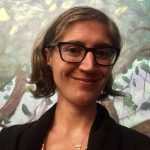
For Dr. Sarah Woulfin, the bridge between research and practice is well-traveled. Now in her fifth year of collecting data as part of a research-practice partnership (RPP) with Hartford Public Schools, Woulfin says creating an open dialogue between research and practice is at the core of her work.
“I want to try to answer questions that people in the field really care about, questions grounded in real-world issues,” she says. “There’s a great deal of work being done to improve schools, to make sure that every child has access to positive educational opportunities every day. I want to make that all more feasible. Increasing and understanding the doability of reform, preventing overload: those are the big picture goals.” – Dr. Sarah Woulfin

Broadly, Woulfin’s current research seeks to understand implementation of reforms in educational systems, especially within urban districts. As school districts work to improve, they often use many levers: updating curricula, meeting state accountability goals, implementing new attendance policies and teacher evaluation methods, and more. Woulfin’s research asks: how do both district and school leaders cope with this mixture of reform pressures? How do districts support teachers in the midst of these reforms? How can districts avoid what Woulfin calls the “too-muchness” of reform?
In her partnership with Hartford Public Schools, Woulfin is able to explore these questions in real time and from many different angles. RPPs are necessarily dynamic, says Woulfin, and her role is continually shifting. Early in the partnership, for example, she was interested in understanding how Hartford was implementing Common Core standards, a national educational initiative that was adopted by Connecticut in 2010. She learned that the district was mostly using instructional coaches for implementation, so she started researching instructional coaches’ roles and responsibilities in Hartford Public Schools – what kinds of support they received, where they were struggling, and so on. Soon, Woulfin started sitting in on professional development sessions for teachers, offering an extra set of hands and and quick-cycle feedback for the coaches. “It’s an interesting dance,” says Woulfin. “I don’t have authority in that sphere, so what I can do is increase access to useful materials, share my experience from other districts, and be a transporter for different techniques.”
Woulfin’s data collection focuses on the instructional coaches and teachers who are experiencing the reforms and the professional development activities: how they experience the reforms and professional development, what they find challenging, and how the daily realities in their school buildings make it easier or harder to take on the tasks that are expected of them. Within the framework of the RPP, Woulfin is able to put her findings in practice in a streamlined way. In addition to working with coaches and teachers, she also advises district leaders. “It gives me a good sense of what the more macro priorities are,” says Woulfin. “Each role in a district faces a different set of pressures.”
Woulfin’s commitment to bridging the gaps between research and practice comes from her own past; before she returned to school and earned her Ph.D. in Education from UC Berkeley, she was a teacher and a reading coach herself. When she was deciding to pursue her Ph.D., the research-practice partnership model was still a relatively new concept. Nevertheless, Woulfin found herself drawn to it, ending up in RPP-style projects before she even fully realized how to classify them. For her doctoral dissertation, for example, she conducted a one-year study of a school district; although not originally designed as such, it soon became an informal RPP. “I kept hearing, ‘you’re back?’” says Woulfin. “There’s something unique about becoming fully embedded in a district instead of dipping in for a shorter period of time. People realize ‘oh, she’s really here.’”
Recently, Woulfin had an experience that exemplifies the uniqueness of the RPP model. “I’ve been working with the math coaching team in Hartford, and recently they created team t-shirts for a Hartford schools event,” she says. “After the event, someone emailed me and said ‘we got you a t-shirt, we’ll give it to you next time!’ I had tears of researcher joy in my eyes. It was a huge moment for me: I truly felt like a part of their community.”
Looking ahead, Woulfin is excited to continue her work in Hartford and also to expand a second RPP with Bristol Public Schools. She is also in the conceptual stages of a project that would bring together urban district administrators from across Connecticut in a “community of practice.” On top of her research-practice work, Woulfin teaches in a multitude of Department of Educational Leadership programs: the Administrator Preparation Program (UCAPP), the Ed.D. program, the Ph.D. in LLEP program, and the Teacher Certification Program for College Graduates (TCPCG). She credits her students, many of whom are school and district leaders themselves, with helping her broker and continue these partnerships. The Department of Educational Leadership is proud of Dr. Woulfin’s outstanding efforts to integrate research and practice in education.